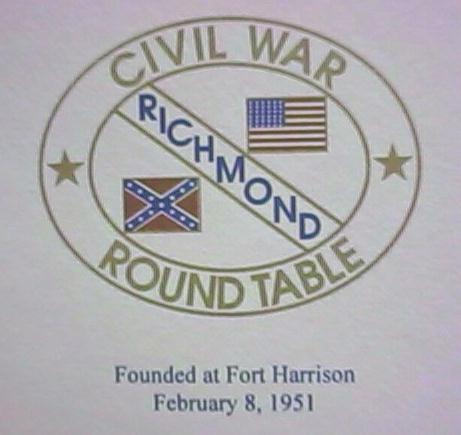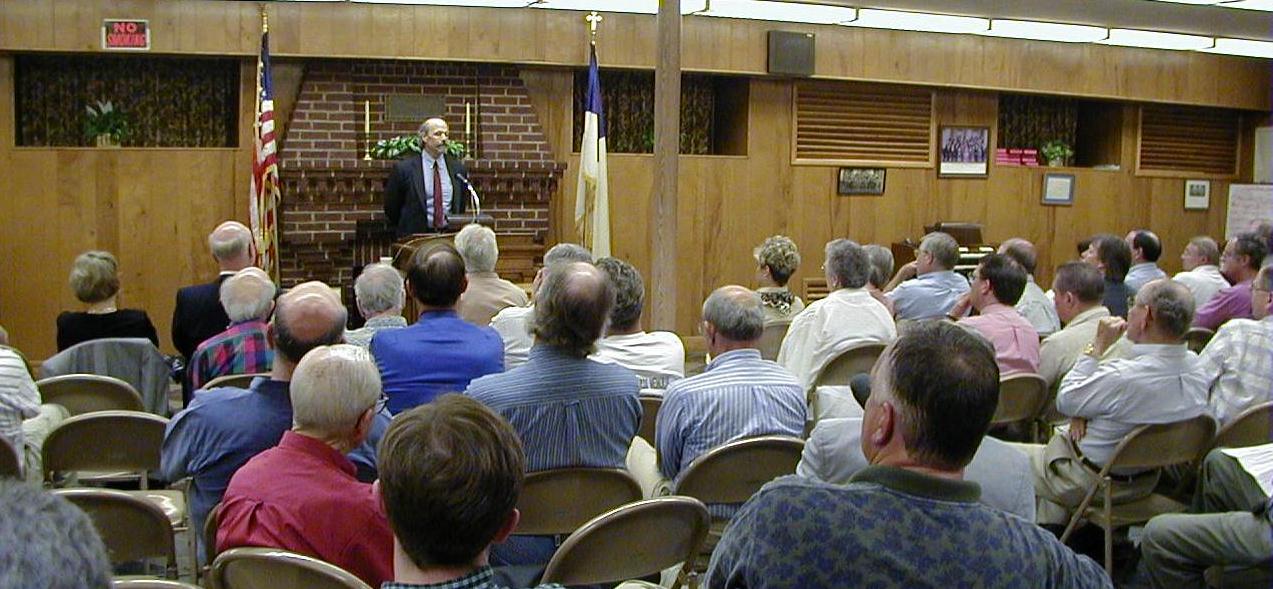


June 2000
R.Danny Witt, President John M.Coski, editor 5500 Ashton Park Way 1201 E.Clay St. Glen Allen, VA 23059 Richmond, VA 23219 June 2000 PROGRAM David Johnson "The Lives of Douglas Southall Freeman" 8:00 p.m., Tuesdav, June 13, 2000 Boulevard United Methodist Church, 321 N. Boulevard (corner of Boulevard and Stuart Ave.) Enter basement door from Boulevard side. How was it that one man could excel simultaneously in three separate careers? Arising each day at 2:30 a.m. helped, but that is only part of the story of this Pulitzer Prize winning author of R. E. Lee, Lee's Lieutenants, and George Washington, preeminent authority on Confederate military history, and long-time editor of the Richmond News-Leader. Years before Paul Harvey or Rush Limbaugh, Freeman were broadcasting news and commentary to a rapt audience. Then came the responsibilities of journalism professor at Columbia, rector of the University of Richmond, lay minister, much sought after speaker, husband and father. No one can fully explain how he did all that he did, historian Dumas Malone wrote. This lecture, and subsequent biography, will offer that explanation. David Johnson serves as counsel to the attorney general of Virginia. A graduate of the College of William and Mary and the T.C. Williams School of Law, he served as co-director of transition for Senator Mark Earley, then joined the attorney general's office. His duties as counsel include the development and implementation of policy and chief speech writer. He is also handling the attorney general's investigation into the sale of the Robert E. Lee Boyhood Home in Alexandria. In 1993 he began writing articles on southern history and politics. His works have been published in many magazines, including Columbiad, Southern Partisan, and American History. In 1993, he began researching the life and work of Douglas Southall Freeman. He has written three lengthy articles about Dr. Freeman and is now in the midst of writing a full biography, which he expects to complete in June 2001.
Thomas Cartwright
"The Battles of Spring Hill and Franklin, Tennessee" Review of May Program Thomas Cartwright, historian and manager of the Carter House in Franklin, Tennessee, offered one of the most animated and impassioned programs that the Richmond Round Table has heard in years. His presentation not only gave the details of the battles of Spring Hill and Franklin on November 29-30, 1864, but also dramatized the human tragedy of battle and censured what Mr. Cartwright believes was the unforgivable leadership of General John Bell Hood. Round Table members accustomed to assessing the leadership of Hood (usually favorably) from his performances on battlefields in the Eastern Theater received a strongly-delivered historical corrective. John Bell Hood was a genuine hero, Cartwright insisted, but "he should have died a hero" at Gettysburg or at Chickamauga, where he suffered debilitating wounds. Instead, he was promoted to command of a corps and to the command of the Army of Tennessee. July 17, 1864 - the day that Hood succeeded Joseph Johnston as army commander - was, Cartwright explained, "the beginning of the end" for the army. The Army of Tennessee was, Cartwright argued, "a great army that deserved better than Braxton Bragg and John Bell Hood - that's my opinion." At Spring Hill, the Army of Tennessee had an opportunity to destroy Gen. John Schofield's divided and out-maneuvered army. Gen. Frank Cheatham's plan to deliver the coup de grÉce against Schofield had to be aborted because Hood interfered and ordered one of the divisions to act contrary to Cheatham's orders. He compounded that error by halting the Confederate pursuit until morning, allowing Schofield to escape the trap. On November 30, the Army of Tennessee was "a dangerous army" - dangerous to itself as well as to the enemy ("You know you can't think straight when you're mad," Cartwright explained). While Hood's subordinates and his men were mad at him, Hood was angry with his army. Believing that the army had "grown soft" under Johnston's command, he was determined to punish Cheatham and his corps for the failure at Spring Hill. This, Cartwright asserted, was the explanation for Hood's battle plan at Franklin, which compelled Cheatham to attack the enemy position without cover. With great detail and passion, Cartwright related many admittedly "nauseating stories" of the hand-to-hand combat that occurred around the Carter House. The attacks failed, but the failure was not, despite Hood's charges, the fault of the soldiers. Defeat at Franklin, Cartwright concluded, "was not [the soldiers'] fault; it was General John Bell Hood's fault - completely." In his official report and in his "vicious book," Advance and Retreat, Hood claimed that he left the Army of Tennessee in better shape than he had assumed it. He also continued to blame the failure of the Tennessee Campaign on the army's inability to fight effectively behind breastworks. The keynote of Mr. Cartwright's presentation was that while he could forgive Hood for his mistakes, he could not forgive his insistence on blaming others, specifically his men, for those mistakes.
Douglas Southall Freeman
on the writing of Confederate History A quarter century before he published R. E. Lee, a young Douglas Southall Freeman catalogued and pored over the manuscripts at the Confederate Museum. One result of his work was the still-useful Catalog of Confederate Papers (1908). In a series of letters to Museum officials, Freeman emphasized the importance of the manuscripts and offered insights into his ideology and perspective as he embarked upon his career as a chronicler of the Army of Northern Virginia: It is a self-evident fact, and one which I need not impress upon the society, that if the real history of the War between the States is ever to be written, such matter now hidden away in private hands and in the collections of societies must be brought before students in a form which will permit historical accuracy and critical citation. The day is past, I trust, when history will be maliciously falsified to suit the whims of Northern writers and the taste of Northern readers. But withal, there is such a great lack of material from the Southern standpoint that the student, unless living in the South, is forced by circumstances to make statements of a general character without having all the evidence before him. . . . They say it was a lost cause: Perhaps it was; but it still lives in the hearts of the Southern people. Its career of arms ended these forty years ago; we only live for its justification.. . . I only beg to state that anything which I can do for this cause, will be gladly done; for it is a cause dear to all in whose veins flows southern blood.
Richard C. Bowles (1946-2000) Richard Bowles, a former president of the Richmond Civil War Round Table, died on April 24th. After living for almost forty years with a life-threatening liver disease, Richard succumbed to liver cancer and kidney failure. He earned a B.A. in history and a Masters of Social Work from Virginia Commonwealth University. A career social worker and advocate for the homeless, Richard continued to pursue his interest in history and the Civil War. He wrote an introduction for and edited a reprint of William Meade Dame's classic From the Rapidan to Richmond for Owens Books, published in 1987.
Hugh Douglas Pitts (1926-2000) Doug Pitts, a long-time Round Table member and former president (1966) died on May 20th after a long illness. A graduate of Thomas Jefferson High School, the University of Richmond, and the College of William and Mary, Pitts was a high school teacher, principal, and assistant superintendent in Henrico County, and adjunct faculty member at William & Mary and at Virginia Commonwealth University. Like many men of his generation, he grew up playing on Confederate earthworks and visiting the Confederate veterans at the Lee Camp Soldiers Home. A leader in the Henrico County Historical Society as well as in the Round Table, Mr. Pitts in 1998 authored for the Society a book on the Dabbs House: High Meadow: Where Robert E. Lee Drew His Sword. Mr. Pitts was buried in Oakwood Cemetery. With their deep interest and knowledge, both men exemplified the rich "amateur" talent that is the heart and soul of this and every Round Table.
Announcements Book Signings. The Museum of the Confederacy is hosting three book signings: * Saturday, June 3, 3-5 p.m.: Joseph L. Harsh, author of Taken at the Flood: Robert E. Lee and Confederate Strategy in the Maryland Campaign of 1862 (winner of the Museum's 1999 Jefferson Davis Award) and Confederate Tide Rising: Robert E. Lee and the Making of Southern Strategy, 1861-1862 * Thursday, June 7, 3-5 p.m.:Jeff Shaara, author of Gone for Soldiers: A Novel of the Mexican War, The Last Full Measure, and Gods and Generals * Saturday, June 10, 3-5 p.m.: Howard Bahr, author of two acclaimed Civil War novels, The Year of Jubilo and of Black Flower Tredegar Iron Works re-opening to the public. On Saturday, June 20, the Tredegar Iron Works site will re-open as the new visitors center for the Richmond National Battlefield Park. Last Call for Ukrop's Golden Gift Certificates. If you still have Ukrop's Golden Gift certificates for purchases made between January 31 and April 1, 2000, there is still time to make them work for the benefit battlefield preservation. Send them ASAP to David West at 88 West Square Dr. / Richmond, VA 23233.
Richmond Civil War Round Table Newsletter John M. Coski, editor 1201 E. Clay St. Richmond, Virginia 23219
Return to News Letters Index
Return to main page

©R.C.W.R.T. 2000
